In this article, we’ll be discussing what gonorrhea is, if it can be helpful to use Doxycycline for gonorrhea, the signs and symptoms of gonorrhea, and when to consult a physician.
Research has shown that gonorrhea is the next most widespread sexually transmitted infection in the U.S. Apart from being highly infectious, it is spread through oral, vaginal, and anal sexual intercourse. The Neisseria gonorrhoeae bacteria cause gonorrhea infections.
If you are diagnosed with gonorrhea, an antibiotic called Doxycycline may be recommended for treating the infection alongside other prescriptions.
Need prescription for Doxycycline?
Get access to a licensed medical professional.
Gonorrhea and HIV
If gonorrhea infections are not dealt with early, it can increase an individual’s chances of getting or transferring the Human Immunodeficiency Virus (HIV).
Signs And Symptoms of Gonorrhoea
Gonorrhea often comes without symptoms, so you may not always notice any signs if you have gonorrhea. And sometimes, even when the symptoms are there, they may be so mild that you don’t see them.
However, even if you’re asymptomatic, there’s every possibility you can still transfer the infection. You are more prone to transmitting gonorrhea to your sex mate when asymptomatic. Possibly because you are not unaware, you are a carrier of Neisseria gonorrhoeae.
How Gonorrhea Is Diagnosed for Men and Women
For men, the gonococcal infection can be diagnosed by sampling their urine, while for women, it is endocervical or vaginal samples using Nucleic Acid Amplification Testing.
You can analyze it using gonorrhea culture, which needs endocervical or urethral swab samples.
In addition, some diagnostic tests for gonorrhea and other infections have been verified for clinical usage. These tests include FDA-cleared rectal and oral examinations.
Symptoms of Gonorrhea In Male Adults
If you are a male, you may start to notice apparent symptoms of gonorrhea between 2-30 days after exposure. Hot flashes or irritation when urinating may be the first signs you discover.
Other Symptoms Include:
- Irritated throat.
- Increased haste to urinate.
- Redness and protruding of your penis head.
- Yellowish, whitish, or greenish discharge from your penis.
- Inflamed testicles.
- Distress when experiencing bowel movements.
- Conjunctivitis.
- Irritation and itching in your anus.
Symptoms of Gonorrhoea In Female Adults
You may not notice any signs of gonorrhea if you are a female. And if you must see any indication, they can appear anywhere from one day or so to many weeks after you have been exposed. The signs are always moderately mild, and they can appear quite related to indications of vaginal yeast or other bacterial diseases, making them difficult to identify.
Likely Symptoms Include:
- Discolored vaginal discharge.
- Discomfort or hot flashes while urinating.
- The urgency to urinate more often.
- Stinging feeling and irritation in your anus.
- Heavy period flow or spotting between your periods.
- Intense anguish in your lower belly.
- Uncomfortable bowel activities.
Other Signs And Symptoms Of Gonorrhea Include
- Chronic painful throat.
- Plague and reddish color in your throat.
- The lymph nodes in your neck start to protrude.
- Fever.
Gonorrhea can also affect your eyes. However, this occurs if you stroke your genitals or the area of the disease and then rub your eyes with the same hand without cleaning them very well.
Symptoms Of Gonorrhea Of The Eye Include:
- Pain and tenderness in your eye.
- Surging in your eyelid.
- Redness and plague in your eyes.
- Whitish or yellowish discharge from your eye.
Prevention of Gonorrhea
The best way to prevent gonorrhea is to practice careful intercourse using latex condoms. You must also stop all oral, anal, and vaginal intercourse with an infected partner. For alternative treatment, you can use polyurethane if both of you are allergic to latex condoms. Careful sex practices are the primary means of decreasing the chance of acquiring gonorrhea or other STDs.
Treatment Options for Gonorrhea
You can’t deal with gonorrhea using household medications. Instead, you must obtain a diagnosis and treatment from a doctor or health professional. Also, since it’s a bacterial infection, we should handle it with antibiotics.
The proposed procedure by the Centre for Disease Control and Prevention (CDC) for the treatment of gonorrhea is a sole intramuscular potion of ceftriaxone, always with additional antibiotics such as Doxycycline.
Due to the possibility of drug opposition, your doctor may occasionally order some monitoring testing to confirm the disease has been wiped out. In some cases, your healthcare provider may recommend checking after 1-2 weeks and having an examination for the treatment again after three months since it’s possible for gonorrhea to infect your body again.
In some cases, preventive antibiotic remedies may be prescribed if you have an increased chance of complications from gonorrhea or repeated gonococcal infections.
 4 4 Symptoms of Gonorrhea of the Eye
4 4 Symptoms of Gonorrhea of the Eye
Doxycycline For Gonorrhea
The 2021 Centre for Disease Control (CDC) STI medication procedures now endorse 500mg ceftriaxone intramuscularly once to handle uncomplicated gonorrhea at every anatomical location. In addition, if co-infection with chlamydia is yet to be prevented, co-therapy with Doxycycline for gonorrhea, 100 mg twice daily for one week should be included.
Using Doxycycline for Gonorrhea
Antibiotics are crucial in gonorrhea treatment because gonorrhea is transferred through sex, and sexually transferred infections are bacterial infections. If you are suffering from gonorrhea, the initial treatment you will receive will be an injection of ceftriaxone and an oral 1-week dose of Doxycycline or azithromycin.
The Doxycycline antibiotic is not powerful enough to deal with a gonorrhea infection alone. In addition, some traces of gonorrhea are immune to antibiotics and will need alternative antibiotics. Suppose you are receiving treatment for gonorrhea and your symptoms do not disappear after seven days or worsen. In that case, you should notify your health care provider so they can administer a new antibiotic.
Inform your sex partners if you have gonorrhea, and ensure they are very aware. They are not exempt from treatment, either, because just treating you alone can cause the infection to be transmitted to your partner. That may lead to drug-resistant pressures and further severe difficulties.
Doxycycline In the Treatment of Other Sexually Transmitted Infections
According to currently updated directions for sexually transmitted infection management, Doxycycline happens to have a revived interest. It is an impressive option compared with other accessible antibiotics for treating some STIs. That is because of its effectiveness, superior tolerability, and oral administration.
Can Doxycycline Alone Cure Gonorrhea?
As a typical bacterial disease, gonorrhea is cured with antibiotics. Therefore, the first therapy chain is an injection of the antibiotic ceftriaxone, coupled with an oral 1-week Doxycycline or azithromycin antibiotic.
Doxycycline antibiotics cannot cure gonorrhea infection single-handedly. This is because it is not robust enough to deal with a gonorrhea infection. In addition, some gonorrhea strains are immune to antibiotics and may need antibiotic alternatives. If your symptoms persist after seven days or get worse upon treatment, inform your physician, who may name a new antibiotic for you.
Can Doxycycline Cure Gonorrhea?
Compound treatment with ceftriaxone 250 mg intramuscularly and 1 g of azithromycin taken orally as a sole mixture or Doxycycline 100 mg twice daily for one week is an exceptionally active remedy for uncomplicated gonorrhea infection.
Doxycycline Dosage For Gonorrhea
Doxycycline dosage for the treatment of uncomplicated gonorrhea caused by Neisseria gonorrhea is 100 mg to be taken orally two times a day for one week.
This dosage is based on the Centre for Disease Control (CDC) recommendation.
Will Five Days of Doxycycline Cure Gonorrhea?
It takes one week to treat gonorrhea with Doxycycline to act in your system and cure gonorrhea. However, when you engage in sexual intercourse without using a condom for one week after taking the treatment, there’s every possibility that you could still transfer the gonococcal infection to your partner, even if you are asymptomatic.
Note These Before Taking Doxycycline
To ensure this medication is protected for you, inform your physician if you have at any time suffered from:
- Liver infection.
- Kidney infection.
- Asthma.
- High tension inside your head.
- If you take seizure drugs or a blood thinner like warfarin.
When Not To Take Doxycycline
Do not take Doxycycline if you constantly react to it or any tetracycline antibiotic like demeclocycline, tigecycline, etc.
Doxycycline for Children
Children who are less than eight years old should take Doxycycline exclusively in situations of extreme or life-threatening circumstances. This medication can lead to perpetual discoloration of children’s teeth.
Doxycycline During Pregnancy
Taking Doxycycline during gestation could injure the developing fetus or result in lasting tooth blemishes later in the baby’s existence.
How To Take Doxycycline
Ensure you adhere to your doctor’s instructions, including the direction written on the prescription headline. Avoid taking this drug in larger or minor quantities or more prolonged than instructed. Also, ensure you swallow it with a full cup of water. Finally, take enough fluids when taking the medication.
When To See a Doctor
We encourage you to see a doctor if you start noticing any of the signs and symptoms listed above linked with gonorrhea, especially if you have many sexual partners or have been informed by your sex partner that may have jeopardized your gonorrhea.
Your physician will perform a proper diagnosis to confirm whether or not you have the infection or other sexually transferred infections and administer suitable medication. Never forget that gonorrhea needs a medical diagnosis and should be handled instantly.
Because gonorrhea is a bacterial disease, it requires antibiotic treatment. Since this infection is expected, some strains of neisseria gonorrhoeae are becoming drug-resistant. If your physician administers antibiotics for gonorrhea, never pause using them until you have taken the whole medication. Even if you start feeling good, keep using them unless instructed otherwise by your healthcare provider.
If you quit taking your drugs, it can result in the re-growth of the disease, or it can result in the expansion of a drug-resistant infection.
What Other Medications Can Affect Doxycycline?
Sometimes you may not be insured to take certain medications at similar periods. That is because some drugs can affect the blood status of other medicines you consume, which can intensify the side effects or bring about less effectiveness.
Some other medications, like vitamins, herbal drugs, prescriptions, etc., might interact with Doxycycline. However, inform your doctor about every medicine you use and any drug you commence or cease.
Frequently Asked Questions
Using Doxycycline alone is not adequate to deal with a gonorrhea infection. In addition, some strains of gonorrhea are opposed to antibiotics and may need alternative antibiotics.
Ceftriaxone antibiotics are administered as an injection, oral azithromycin (Zithromax), and Doxycycline.
Yes. Tetracycline is an antibiotic used to treat several bacterial infections of the urinary tract, genitals, and other body areas. It also treats sexually transferred diseases like syphilis, gonorrhea, or chlamydia.
It inhibits any further growth of bacteria during the treatment of bacterial infections. Within a few days, your body will respond better to treatment, but completing your dosage is crucial for the best results.
Yes. With several quantities of amoxicillin, gonorrhea can be remedied in a few days. In the past, antibiotics like amoxicillin have been recommended by physicians to deal with gonorrhea.
There are no interactions between Azithromycin and Doxycycline.
Twice daily for seven days. However, avoid having vaginal, oral, or anal sex for at least seven days after starting treatment for gonorrhea. Your doctor will inform you when you are safe to resume sexual activity.
Yes. When you take the correct prescription from your doctor. But, the initial treatment is an injection of ceftriaxone, paired with an oral 1-week course of Doxycycline or azithromycin. Doxycycline alone is not powerful enough to deal with a gonorrhea infection.
No. It takes seven days for the medication to work in your body and cure gonorrhea. However, suppose you have sex without a condom for one week after taking your drugs; there is every possibility that you will transmit the infection to your sexual partners, even if you are asymptomatic.
Doxycycline is used in treating various types of sexually transmitted infections like syphilis, gonorrhea, and chlamydia.
It takes 1 to 2 weeks for symptoms to go away. However, do not engage in sex during this period to prevent transferring the infection.
Some difficulties from these STIs can happen to just about anybody. Others are distinct to each sex because of variations in sexual anatomy. However, gonorrhea has further severe possible complications and is more inclined to result in long-term crises like infertility.
Ready to Seek Professional Help?
For gonorrhea, it would be best to keep in touch with your healthcare provider in case of any side effects. Else, it might get severe. To help you stay healthy, we have made it easier to get immediate attention from a doctor.
At Doctoralexa, you’ll get a convenient, fast, and confidential online telemedicine service. We will diagnose your condition and give you the right prescription right to your doorstep. Plus, our services are very affordable. Don’t hesitate. Call a doctor right away.





